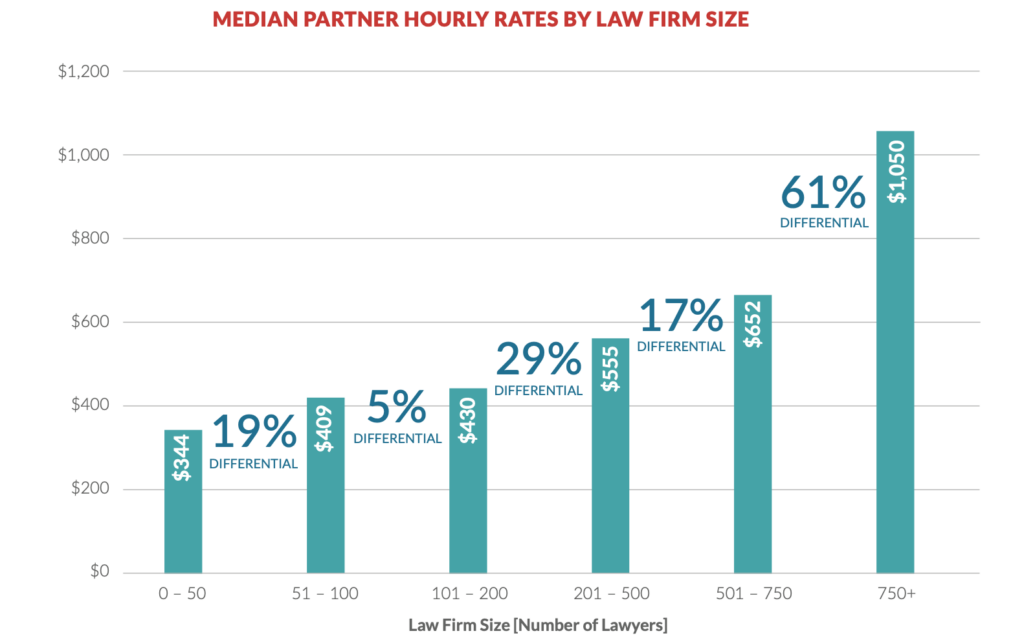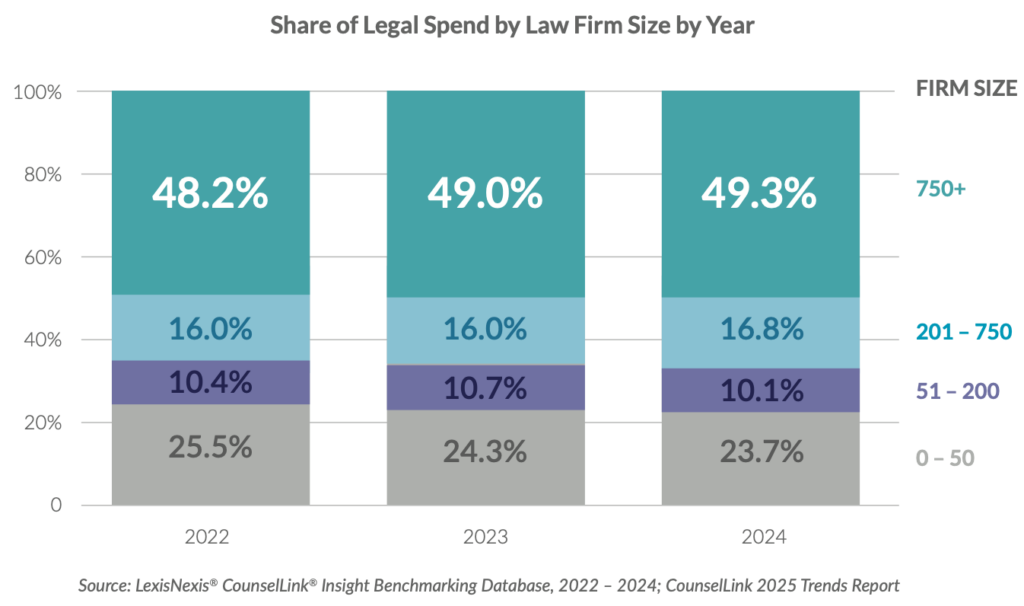
While everyone was busy doomscrolling… everything, Biglaw quietly tightened its grip on the legal market. Again.
If you were wondering how almost half the Am Law 100 now qualify as “super rich”, look no further than the newly dropped 2025 CounselLink Trends Report. The annual deep dive into client spending reveals that law firms with 750+ lawyers account for 49.3 percent of all legal spend. That’s a healthy amount since the report clocked $67 billion in total legal spend last year.
The yacht budget is safe.
But how is this possible when legal departments project a non-stop background noise of “spend control” and gripes about finally standing up to rising billable rates? They’ve been telling the firms — and anyone else who will listen — this for a long time. And how have the firms responded?

Partner rates rose another 5.1 percent on average in 2024, the second-highest jump on record. But that doesn’t tell the whole story because among the biggest firms — the ones hoovering up nearly half the legal spend — the median partner billed at a rate 61 percent higher than the median partner in the next tier of firms. Biglaw partners are billing over $2,300/hour, and the highest tier of associates in these firms are hitting $1,900/hour.

So while clients talk a big game about strategies to manage “timekeeper mix,” partners keep sending invoices that could get Fabergé to host an Easter Egg hunt.
No one gets fired for hiring Cravath — or whatever variant of that adage you grew up with — appears alive and well. And the big firms know it. For all the grumbling about clients getting serious about spend, when the company is at stake, boards are going to want to see brand name letterhead even if it comes at a premium.
And then they’ll threaten Legal’s budget next year. Circle of life.
As interesting as Biglaw’s dominance is small law’s steady rise. After Biglaw, it’s the smaller firms with the next biggest share of the legal spend, at nearly a quarter.

Small law has slipped slightly since 2022, to the benefit of the 201-750 firms (and, of course, the inexorable flow of cash to Biglaw), but these firms still enjoy an advantage over their next bigger rivals. Capturing this much raw legal spend is even more impressive considering how much cheaper they are.
So there’s a bit of a dumbbell effect, with goliath firms on one side and specialized, laser-focused boutiques on the other. In between, there’s traditionally a whole lot of pricing pressure and existential angst. Seeing midsized firms tick up a bit might be worth watching over coming years as that tier ventures — belatedly — into tech adoption. That could increase the tier’s competitiveness with bigger firms who leverage tech because they can afford it and small firms who leverage tech because they can’t afford not to.
Did you see that scientists are trying to bring back the Wooly Mammoth? That seems like a non sequitur in this article, but it sets up the following segue, so stop nitpicking and indulge me.
The report does not directly address the Wooly Mammoth in the room: the role generative artificial intelligence tools will play in how clients distribute future work. While the legal tech vendor community would probably call it the elephant in the room, it’s better to think of it as big, ground-breaking, and… not actually here. Generative AI brings a lot of hype, but it’s not about to convince in-house lawyers to swap their outside counsel yet. But it just because it’s not going to replace lawyers doesn’t mean it’s not going to have a significant impact on the legal workflow and, by extension, the bills.
Will it usher in the $10,000/hour lawyer? Does that finally make clients balk? Will it instead spur more alternative fee arrangements — if not for whole matters, then for predictable work product at specific stages of an engagement? Which firms will take the chance to build a new model of billing first?
Or maybe the firms will just keep complaining while shelling out bigger and bigger payments. Why mess with success?
2025 CounselLink Trends Report [LexisNexis CounselLink]
 Joe Patrice is a senior editor at Above the Law and co-host of Thinking Like A Lawyer. Feel free to email any tips, questions, or comments. Follow him on Twitter or Bluesky if you’re interested in law, politics, and a healthy dose of college sports news. Joe also serves as a Managing Director at RPN Executive Search.
Joe Patrice is a senior editor at Above the Law and co-host of Thinking Like A Lawyer. Feel free to email any tips, questions, or comments. Follow him on Twitter or Bluesky if you’re interested in law, politics, and a healthy dose of college sports news. Joe also serves as a Managing Director at RPN Executive Search.